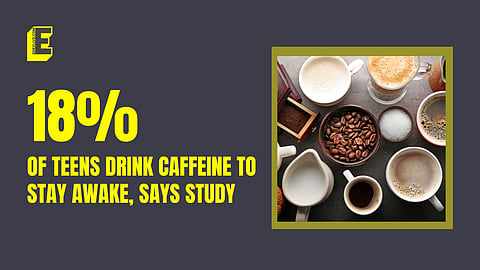

New research data released today, Monday, May 20, indicated that 18 per cent of parents who said their kid drinks caffeine most or all of the week do so to "stay awake". According to a survey conducted by the University of Michigan in the United States, one-quarter (25 per cent) of parents claim that their teen takes caffeine on a regular or nearly daily basis.
"Our report suggests parents may not always be aware of how much they should be limiting caffeine consumption for teens," said poll co-director and Mott paediatrician Susan Woolford, MD.
The study is based on responses from 1,095 parents of teens polled in February, reports IANS.
Parents stated that soda (73 per cent) is the most common source of caffeine for their teen, followed by tea (32 per cent), coffee (31 per cent), energy drinks (22 per cent), and eating out (43 per cent). They also stated that their teen consumes caffeine most frequently at home (81 per cent) while dining out (43 per cent), with friends (three per cent), and at school (25 per cent).
"Caffeine is a drug that stimulates the brain and nervous system, and too much of it can contribute to a variety of health problems in young people," Woolford said.
The American Academy of Paediatrics advises children and adolescents against consuming caffeine, while other experts recommend a daily maximum of 100 milligrams for teens, according to the study.
Around 60 per cent of parents claimed they had heard of the dangers of highly caffeinated goods, although roughly half stated that they rarely consider caffeine levels while purchasing beverages for their teen.
"Parents should consider talking with their teen about the negative impact of excessive caffeine, and then explore non-caffeinated options they can try together at home, at school or when out with friends," Woolford said.
"Parents may also enlist the teen’s healthcare provider in explaining the risks of caffeine and suggesting strategies to cut back," she added.
